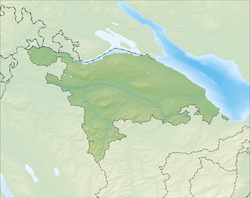Mannenbach
| Salenstein | ||
|---|---|---|
 |
||
|
||
| Coordinates: 47°40′N 9°3′E / 47.667°N 9.050°ECoordinates: 47°40′N 9°3′E / 47.667°N 9.050°E | ||
| Country | Switzerland | |
| Canton | Thurgau | |
| District | Kreuzlingen | |
| Area | ||
| • Total | 6.54 km2 (2.53 sq mi) | |
| Elevation | 400 m (1,300 ft) | |
| Population (Dec 2015) | ||
| • Total | 1,282 | |
| • Density | 200/km2 (510/sq mi) | |
| Postal code | 8268 | |
| SFOS number | 4851 | |
| Surrounded by | Berlingen, Ermatingen, Gaienhofen (DE-BW), Raperswilen, Reichenau (DE-BW) | |
| Website |
www SFSO statistics |
|
Salenstein is a municipality in Kreuzlingen District in the canton of Thurgau in Switzerland.
Salenstein was the home village of Napoleon III, who lived at Castle Arenenberg in his youth.
In the Eichholz area near Salenstein, burial mounds from the late Hallstatt period (750-450 BC) have been discovered. The modern village of Salenstein is first mentioned in 1092 as Salestein. In the 11th Century, Salenstein Castle was built as a seat for the Ministerialis (unfree knights in the service of a feudal overlord) officials of Reichenau Abbey. The smaller castles of Sandegg and Riederen were added to provide further housing for the officials. The land rights, Herrschaft rights and the low court rights were all held by the Abbey. In 1401, the noble Clare of Breitenstein, founded a Béguinage house in the Götschen woods, which was known as Blümlistobel. At some time before 1520 the Augustinian rule was introduced at the house. In 1534 a fire destroyed Blümlistobel house and it was rebuilt 1537. The last sister lived there until 1545, when she moved to Reichenau Abbey.
In the early modern period the villages incurred a massive debt. Mannenbach and Salenstein had to seek credit several times and 1573 they had to use their common forest (German: Allmend) as collateral for a loan.
...
Wikipedia




